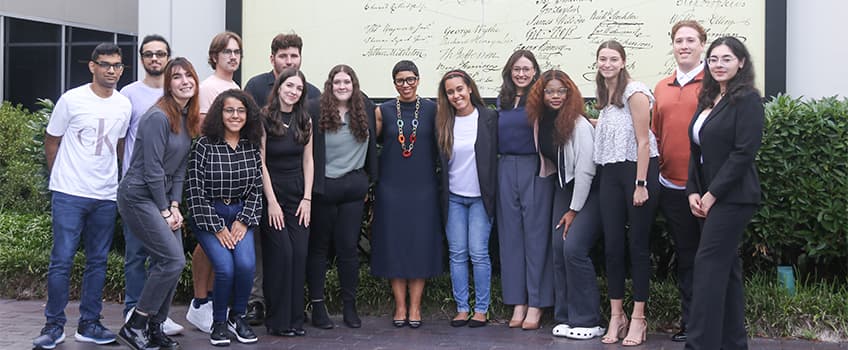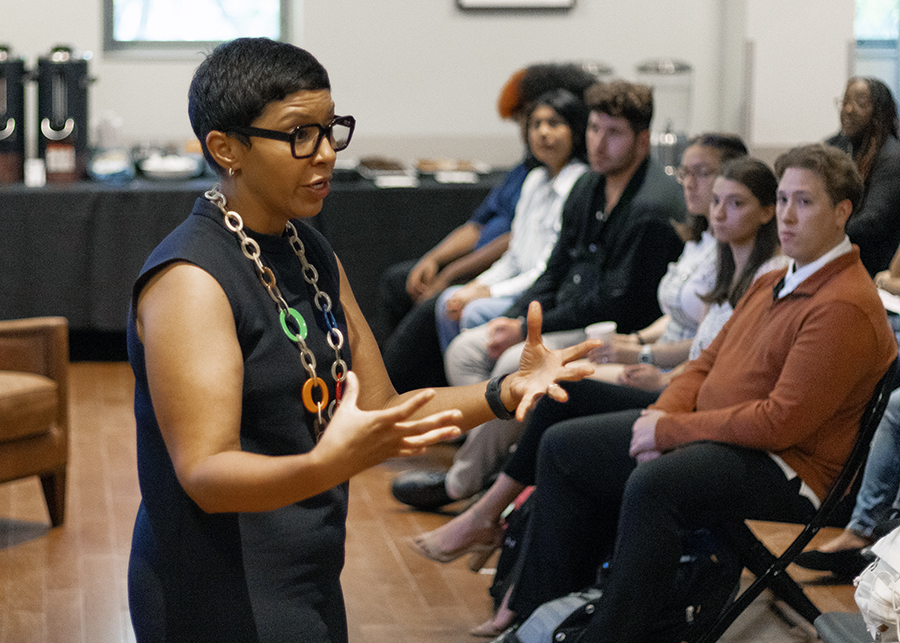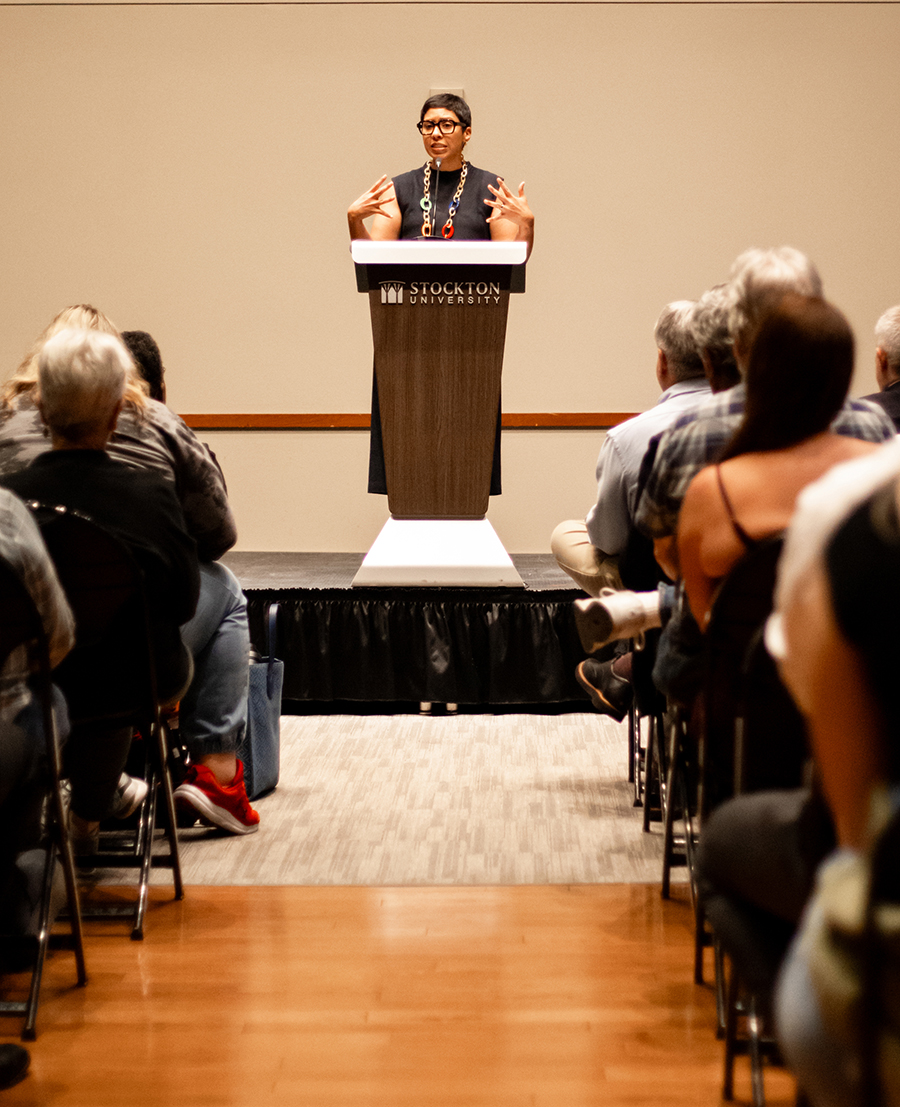NYU Professor Addresses Dobbs Decision at Constitution Day

Galloway, N.J. — Opponents of the recent U.S. Supreme Court decision to overturn Roe vs. Wade are in for a long battle, but it’s a battle that can be won, according to Melissa Murray, the keynote speaker at Stockton University’s annual Constitution Day.
Murray, the Frederick I. and Grace Stokes Professor of Law at New York University’s School of Law, spoke for about an hour on Oct. 2 about the impact of the court’s decision in Dobbs vs. Jackson Women’s Health Organization, which took away the federal right for a woman to have an abortion.


Top, New York University law professor Melissa Murray addresses a group of Stockton students before her keynote address at the annual Constitution Day, below.
She said that the movement to overturn Roe took a lifetime, and she suspects the countermobilization against Dobbs is going to take a similar amount of time.
“There is no immediate fix for this,” said the professor who teaches constitutional law, family law, criminal law and reproductive rights and justice. “If you are interested in countermobilizing against this decision, you are going to have to be prepared to limber up, hydrate and pack a lunch. It’s going to be a long fight. I probably won’t be around for the end of this, but it can happen. If Roe can be overruled, then Dobbs can be overruled.”
Before Murray’s lecture, Lauren Balasco, an associate professor of Political Science, welcomed the crowd of several hundred students, staff, faculty and alumni to the 18th annual event.
“We are so proud of the Constitution Day legacy at Stockton, and we are happy for all of you to exercise your civil commitment to learn more about our democracy and its constitutional foundations,” said Balasco, who is co-chair of the Constitution Day Planning Committee.
Stockton President Joe Bertolino echoed Balasco’s comments adding that it is the university’s responsibility to help students and the community better understand the world around them, adapt to change and learn from a diverse array of perspectives.
“The strength of democracy relies on all of us to be educated on the issues that affect not only our community, but those beyond our state, region and nation. And to understand that our actions and our inactions have lasting consequences that can impact communities for generations to come,” he said.
“It is imperative that we in higher education provide the spaces for difficult conversations to transpire. Colleges and universities like Stockton have the responsibility to look at issues from all sides and give a chance for each voice to be heard.”
During her lecture, Murray discussed how the Dobbs decision has come at a time when the Supreme Court has also issued other anti-democratic decisions on voting rights and redistricting.
She talked about the judicial term “stare decisis,” which is Latin for “let the decision stand.” Murray said the doctrine has always guided the High Court to ensure predictability and continuity within the legal system — even if the current court disagrees with them.
However, Murray mentioned that the court is also allowed to depart from stare decisis if there are special justifications. In the case of Dobbs, the majority opinion insisted that the 1973 Roe vs. Wade decision that established the right to an abortion had preempted debate and state legislative deliberations on the issue of abortion rights. Justice Samuel Alito, who wrote the majority opinion, insisted that democratic deliberation should be the proper mechanism to resolve the competing interests in the abortion debate.
“The court was doing no more than rightfully returning this question to the people and the prospect of true democratic deliberation,” Murray said of the opinion. “It cast the majority as heroes — reportedly restoring the people’s voices.”
I believe, even in this moment of polarization and challenge, that we can come together and find a way forward, together."
“Dobbs proports to return the abortion question to the people at precisely the moment when the court’s own actions have ensured that the political landscape is unlikely to produce general deliberation or to yield truly democratic outcomes,” she said.
Murray returned to the discussion of voting rights during a 20-minute question-and-answer session with the audience in which she touched on how difficult it’s going to be to reverse the Dobbs decision because of movements to suppress voting rights.
“The distortion is real. Its impact is enormous. It means that you have to work that much harder to counteract the impact of the distortion,” she said. “There’s no way around this but through it — more work, more people, getting them to the ballot box. … You have to get more people voting.”
And the professor, who has made several appearances as a commentator on MSNBC, urged that those who want change shouldn’t “hope for a day when liberals take over,” but instead “learn to talk to each other.”
“You are going to have to learn to change hearts and minds,” she said. “You are going to have to talk to people where they are. You are going to have to appeal to a set of values that we all share, even in a time when it doesn’t feel like we share much of anything.
“That’s the only way that we are going to get to the other side of this. … I believe, even in this moment of polarization and challenge, that we can come together and find a way forward, together.”
The annual Constitution Day event is sponsored by the Political Engagement Project/American Democracy Project, the William J. Hughes Center for Public Policy, the Center for Community Engagement and Service-Learning and the Office of the Provost.
Since 2006, Stockton has celebrated the signing of the Constitution with a keynote address and related events to promote a better understanding of our Constitution.
-- Story by Mark Melhorn, photos by Lizzie Nealis and Gianna Schiattarella


